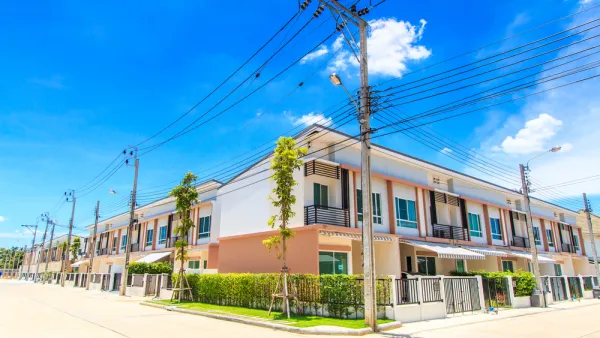Both supporters and opponents of the sprawl status quo often refer to suburbia as “The American Dream.” One sprawl-defending organization even calls itself “The American Dream Coalition.”
Both supporters and opponents of the sprawl status quo often refer to suburbia as "The American Dream." One sprawl-defending organization even calls itself "The American Dream Coalition". Sprawl critics use similar language; for example, in 1998, the Sierra Club issued a report titled "Sprawl: The Dark Side of the American Dream."
The equation of the "American Dream" with sprawl is inconsistent with the term's original meaning. The term "American Dream" was apparently invented in 1931 by historian James Truslow Adams; he was referring to "That dream of a land in which life should be better and richer and fuller for every man, with opportunity for each according to his ability or achievement." (Youngro Lee, To Dream Or Not To Dream, 16 Cornell Journal of Law and Public Policy 231, 232). Thus, the term "American Dream" means not one type of house on one type of lot, but an economy open to talent, whether in dense cities, streetcar suburbs, or small towns.
More importantly, the use of the term "American Dream" to describe just one type of development is so inconsistent with America's libertarian values as to be almost un-American.
In the Declaration of Independence, Thomas Jefferson wrote that people are "endowed by their creator with certain unalienable rights, that among these are life, liberty and the pursuit of happiness." To me, "liberty" implies some diversity of living arrangements - not just suburbs, but big cities and small, rural retreats and small towns. "Liberty" implies that Americans should be free to create Manhattan as well as Montana.
By contrast, the use of the term "American Dream" to describe the sprawl status quo implies that only one form of development is "American" - that large-lot suburbia, as the "American Dream", is what all real Americans want, and that cities and small towns and rural areas are for foreigners. There is nothing particularly libertarian about such an attitude.
Sprawl critics weaken their position by allowing their opponents to get away with such abuses of patriotism. Instead, supporters of more compact development should be reclaiming the mantle of Americanism themselves - for example, by suggesting that people are freer when they can walk as well as drive.

Analysis: Cybertruck Fatality Rate Far Exceeds That of Ford Pinto
The Tesla Cybertruck was recalled seven times last year.

National Parks Layoffs Will Cause Communities to Lose Billions
Thousands of essential park workers were laid off this week, just before the busy spring break season.

Retro-silient?: America’s First “Eco-burb,” The Woodlands Turns 50
A master-planned community north of Houston offers lessons on green infrastructure and resilient design, but falls short of its founder’s lofty affordability and walkability goals.

Test News Post 1
This is a summary

Analysis: Cybertruck Fatality Rate Far Exceeds That of Ford Pinto
The Tesla Cybertruck was recalled seven times last year.

Test News Headline 46
Test for the image on the front page.
Urban Design for Planners 1: Software Tools
This six-course series explores essential urban design concepts using open source software and equips planners with the tools they need to participate fully in the urban design process.
Planning for Universal Design
Learn the tools for implementing Universal Design in planning regulations.
EMC Planning Group, Inc.
Planetizen
Planetizen
Mpact (formerly Rail~Volution)
Great Falls Development Authority, Inc.
HUDs Office of Policy Development and Research
NYU Wagner Graduate School of Public Service





























